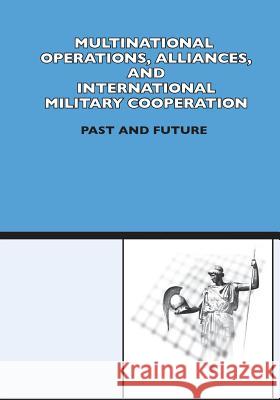Multinational Operation, Alliances and International Military Cooperation: Past and Future » książka
Multinational Operation, Alliances and International Military Cooperation: Past and Future
ISBN-13: 9781505319200 / Angielski / Miękka / 2014 / 228 str.
International cooperation, whether based on fixed alliances or on ad hoc coalitions, obviously is now and will be in the future a main feature of practically all military operations. It therefore seemed fitting to look more closely into this topic in the course of the papers presented at the Military History Working Group's (MHWG's) 2005 workshop. More than forty scholars and officers from sixteen countries examined different aspects of military cooperation and, in frank and spirited discussions, contributed to a better understanding of many of the problems involved in the endeavor. The conference was organized jointly by Austria and Canada, represented respectively by the National Defense Academy (Vienna) and the Royal Military College of Canada (Kingston, Ont.). Erwin A. Schmidl (Austria) and Ronald G. Haycock (Canada) acted as cochairs, with the local organization handled by Felix Schneider, Johann Bartl, and Ernst M. Felberbauer. Support from the Partnership for Peace Consortium (PfPC) was channeled through Vernon Hodges from the George C. Marshall Center at Garmisch-Partenkirchen. Special credit for their untiring support is due to Brig. Gen. John S. Brown, William W. Epley, and Robert S. Rush from the U.S. Army Center of Military History. Indeed, over the years the continued successes of MHWG conferences owe a great deal to Rush's personal organizational enthusiasm. The papers presented at the conference dealt with a variety of topics under the umbrella theme alliances and multinational cooperation. Taken together, the papers covered several different national experiences during four centuries of history. In opening remarks, Erwin A. Schmidl presented an overview of some of the issues associated with the general topic. Whereas political-military cooperation is nearly as old as humankind, formal alliances are closely linked to the system of territorial states-a system usually associated with the 1648 Peace of Westphalia- and currently are undergoing dramatic changes that also will reflect on the very concept of alliances. In any case, numerous experiences from earlier operations reveal general characteristics that are still valid today, and one of the MHWG's aims was to deal with issues currently relevant at a time when international associations and other alliance structures, such as the European Union (EU) and the North Atlantic Treaty Organization (NATO), are undergoing a period of strain and transformation. In this way the MHWG is able to contribute usefully to the overall success of the Partnership for Peace Consortium.
Zawartość książki może nie spełniać oczekiwań – reklamacje nie obejmują treści, która mogła nie być redakcyjnie ani merytorycznie opracowana.











